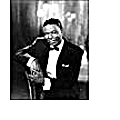 Born Nathaniel Adams Coles on March 17, 1971, he was one of thirteen children born to the Reverend Edward James Coles, Sr. and Perlina Adams Coles. Only five of the Coles’ children lived to adulthood, and when Nat was about four years old, the family moved from Montgomery, Alabama to Chicago, Illinois. Here his father became minister of the “True Light Baptist Church.”
Born Nathaniel Adams Coles on March 17, 1971, he was one of thirteen children born to the Reverend Edward James Coles, Sr. and Perlina Adams Coles. Only five of the Coles’ children lived to adulthood, and when Nat was about four years old, the family moved from Montgomery, Alabama to Chicago, Illinois. Here his father became minister of the “True Light Baptist Church.”
Exhibiting musical talent even at the age of four, Nat’s first public performance at the piano was at The Regal Theater in Chicago. At the age of twelve, Nat played the organ and sang in his father’s church, even though the music that really interested him, jazz, was not acceptable to his religious parents. Three of his brothers, however, Eddie, Fred and Isaac, were already jazz musicians, paving the way for him. One of Nat’s earliest gigs was playing in Eddie Coles’s band, “The Rogues of Rhythm.”
In 1936 Nat moved to Los Angeles where he formed a musical group that would later be known as the King Cole Trio. (The “s’ from his name was dropped and the new one came from a club gig in which the performers all took on names of famous fairy tales. He picked King Cole and it stuck.) In 1943, he recorded his first hit record, “Straighten Up And Fly Right”, which was based on one of his father’s sermons. He had five hits in succession after that: “It’s Only a Paper Moon” (1945), “The Christmas Song” (1947), “Nature Boy” (1948), “Mona Lisa” (1949) and “Too Young” (1951).
Nat King Cole was the first black musician to have his own weekly radio show (1948-49) as well as his own television show on network television (1956-1957). In 1956, Cole returned to Alabama where his integrated band played to a segregated audience in Birmingham. Four members of the White Citizens Council (euphemism for KKK?) attacked him on stage. He was hurt but still completed his performance in front of the audience of 4,000. He vowed never to return to the south and he never did.
He was a man of many gifts who died too soon from lung cancer on February 15, 1965. He was a consummate musician with a voice of velvet that sounds like no other. His legacy is rich and plentiful, but could have been so much more had he only lived long enough to know how much he is loved and respected in the world of music today.
Visit the Nat King Cole Society at: http://www.nat-king-cole.org for more information about the life and music of the inimitable Nat King Cole.

